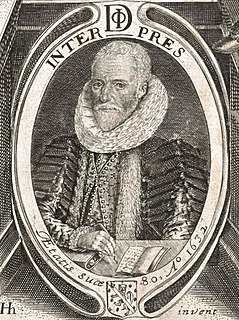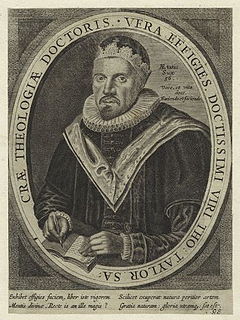Related Research Articles

Philemon Holland was an English schoolmaster, physician and translator. He is known for the first English translations of several works by Livy, Pliny the Elder, and Plutarch, and also for translating William Camden's Britannia into English.

Thomas Adams (1583–1652) was an English clergyman and reputed preacher. He was called "The Shakespeare of the Puritans" by Robert Southey; while he was a Calvinist in theology, he is not, however, accurately described as a Puritan. He was for a time at Willington, Bedfordshire, and his works may later have been read by John Bunyan.
Anthony Burges or Burgess was a Nonconformist English clergyman, a prolific preacher and writer.
Theodore Goulston M.D. (1572–1632) was an English physician, scholar, and founder of the Goulstonian Lectures.
John Downame (Downham) (1571–1652) was an English Puritan clergyman and theologian in London, who came to prominence in the 1640s, when he worked closely with the Westminster Assembly. He is now remembered for his writings.

Thomas Taylor (1576–1632) was an English cleric. A Calvinist, he held strong anti-Catholic views, and his career in the church had a long hiatus. He also attacked separatists, and wrote copiously, with the help of sympathetic patrons. He created a group of like-minded followers.

Robert Hill was an English clergyman, a conforming Puritan according to Anthony Milton.
Thomas Walkington was an English cleric and author.
Thomas Reid was a Scottish humanist and philosopher who became Latin secretary to King James VI and I.
Anthony Maxey, was the Dean of Windsor.
Thomas Ashe or Ash, was an English legal writer. Ashe entered as a student of Gray's Inn in 1574, was called to the bar 24 January 1582–83, and became pensioner of his inn 17 October 1597.
Thomas Tuke (c.1580–1657) was an English clergyman and controversial writer, of royalist views in later life.
Francis Walsingham was an English Jesuit priest, who assumed the name John Fennell.
Henry Holland (1583–1650?) was an English bookseller and printer.
William Gace, was an English translator.
Daniel Dyke was an English academic, a Puritan of the reign of James I.
John Towne (1711?–1791) was an English churchman and controversialist, archdeacon of Stow from 1765.
Simon Patrick was an English gentleman of Lincolnshire, known as a translator.

John White (1570–1615) was an English clergyman, known as a royal chaplain and controversialist.
William Crashaw or Butt (1572–1626) was an English cleric, academic, and poet.
References
- ↑ "Drax, Thomas (DRS588T)". A Cambridge Alumni Database. University of Cambridge.
- . Dictionary of National Biography . London: Smith, Elder & Co. 1885–1900.
- Attribution
![]() This article incorporates text from a publication now in the public domain : "Draxe. Thomas". Dictionary of National Biography . London: Smith, Elder & Co. 1885–1900.
This article incorporates text from a publication now in the public domain : "Draxe. Thomas". Dictionary of National Biography . London: Smith, Elder & Co. 1885–1900.
This article relies largely or entirely on a single source .(January 2011) |